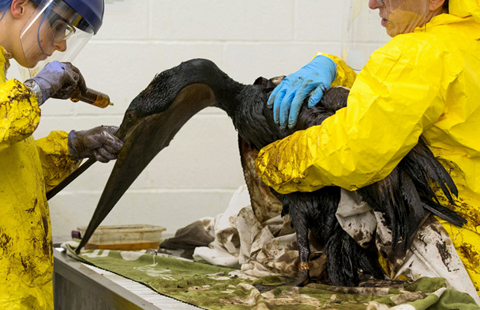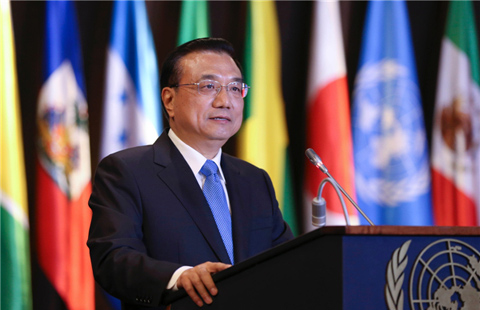China cautions US over South China Sea
Updated: 2015-05-27 03:10
By CHEN WEIHUA in Washington(China Daily USA)
|
||||||||
China has rebuked US criticism blaming China for tensions in the South China Sea, and instead criticized the United States for stoking the fire.
Foreign Ministry spokeswoman Hua Chunying dismissed the freedom of navigation concern raised by US officials, in particular by Assistant Secretary of State for East Asian and Pacific Affairs Daniel Russel in Washington on May 21.
Hua said that for a long time there has never been any problem concerning freedom of navigation and over-flight in the South China Sea that all countries are entitled to under international law.
"Nor will there be any in the future," she told a daily briefing in Beijing on Monday.
But Hua noted that freedom of navigation and over-flight are not tantamount to violating international law by foreign military vessels and aircraft in defiance of the legitimate rights and interests as well as the safety of over-flight and navigation by other countries.
"The close reconnaissance conducted by the US military aircraft of China's maritime features is highly likely to cause miscalculation and untoward incidents in the waters and airspace, and is utterly dangerous and irresponsible," she said.
Hua's comments came after a CNN news crew aboard a US Air Force P8-A Poseidon surveillance plane on May 20 reported that it heard the Chinese PLA Navy warn the plane eight times to leave as it flew over a Chinese island in the South China Sea.
When asked if conducting such surveillance flight is smart diplomacy, Russel contended that the plane was in international airspace and waters.
"We will continue to fully exercise our rights globally to the international space," he told the press on May 21.
The US has also complained about intercepts of its surveillance planes by Russian fighter jets. But when Russian military aircraft flew close to the US air defense zone in Alaska or airspace near its NATO allies in recent months, it triggered a saber-rattling response from the US military, politicians and news media.
Hua said China firmly opposes the US provocation and has lodged strong representations with the US.
"I'd like to reiterate that China's determination to safeguard national sovereignty and territorial integrity is as firm as a rock. We urge the US side to correct its mistake, stay rational and cease irresponsible words and deeds," she said.
According to Hua, China and ASEAN countries are fully and effectively implementing the Declaration on the Conduct of Parties in the South China Sea (DOC). Consultations on a code of conduct are making steady progress and all parties are striving to seal the code of conduct based on consensus, she said.
"The US is not a party concerned to the South China Sea issue. Instead of stirring up trouble, it should show full respect for efforts by China and ASEAN countries, be discreet with words and actions and create an enabling environment for the consultation," Hua said.
In the briefing on May 21 about Secretary of State John Kerry's recent trip to China and South Korea, Russel pointed fingers at China for causing tension in the South China Sea with land reclamations and lack of progress on the diplomatic front in reaching a code of conduct with ASEAN.
"I have to say that, as a diplomat with considerable experience working with the Chinese to get things done, I know that they can be marvelously productive and efficient," Russel said.
"And so I know of no reason why China and the ASEAN countries cannot successfully negotiate a code of conduct by the time they meet at leaders' level in Kuala Lumpur in November of this year, and that is certainly something that I would like to see,"
Many Chinese hold the view that intervention by the US in the maritime territorial dispute has complicated the situation when the US is eager to assure its allies and protect its primacy in the region.
Fu Ying, chairwoman of the Foreign Affairs Committee of the National People's Congress, China's legislature, and a former vice foreign minister, said last week that China sees inconsistencies at play.
"When China's neighbors act provocatively on territorial issues, the US turns its head away. Yet when China defends its interests, it is described as either assertive or a bully," she said on May 19 in remarks about China's economic growth at the University of Chicago.
There is a growing concern that China and the US, the world's two largest economies, are drifting into geopolitical rivalry such as in the South China Sea despite their growing economic interdependence.
Writing in the China US Focus on May 22, Joan Johnson-Freese, a professor at the US Naval War College, said that both countries understand that a military confrontation between them over sovereignty issues relating to the South China Sea is not in either country's interests. But she pointed out that "neither is willing to budge from what it considers actions key to protecting vital national interests."
chenweihua@chinadailyusa.com

 California oil spill takes toll on marine mammals
California oil spill takes toll on marine mammals
 Ten photos you don't wanna miss - May 27
Ten photos you don't wanna miss - May 27
 Family photos for mountain-dwellers
Family photos for mountain-dwellers
 A young part-time chauffeur on the road
A young part-time chauffeur on the road
 Death toll from heat wave in India nears 800
Death toll from heat wave in India nears 800
 Tech giants shine on Intl Big Data Expo 2015
Tech giants shine on Intl Big Data Expo 2015
 Premier Li urges production capacity co-op between China, LatAm
Premier Li urges production capacity co-op between China, LatAm
 US honors war dead on Memorial Day
US honors war dead on Memorial Day
Most Viewed
Editor's Picks

|

|

|

|

|

|
Today's Top News
Li seeks 'dual track' for Chile exchanges
China cautions US over
South China Sea
China, Cuba emphasize confidence
Storms kill 16 in Texas, Oklahoma; Houston flooded
Obama to host South Korea's Park in mid-June
California oil spill takes toll on marine mammals
China issues first white paper on military strategy
China, Chile ink multi-billion-USD currency swap deal
US Weekly

|

|







